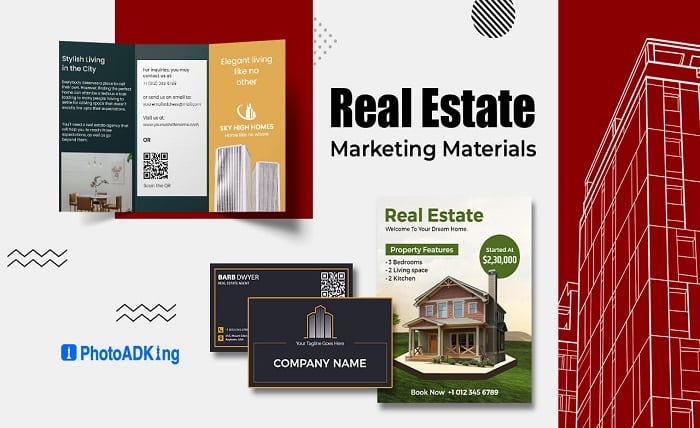In the competitive world of real estate, showcasing your expertise through marketing materials is crucial for attracting potential clients and establishing a strong professional presence.
Effective marketing not only highlights your skills and achievements but also demonstrates your deep understanding of the market, building trust and credibility.
This article will explore the importance of marketing knowledge and the different expertise required to create compelling real estate marketing materials.
The Importance of Marketing Knowledge in Real Estate
1. Building Trust and Credibility
Marketing materials that effectively showcase your expertise help build trust and credibility with potential clients. They demonstrate your knowledge, experience, and professionalism, which are essential for gaining clients’ confidence.
2. Attracting and Retaining Clients
Well-crafted marketing materials can attract new clients and retain existing ones by highlighting your unique selling points and the value you bring to the table. They set you apart from competitors and create a lasting impression.
3. Enhancing Visibility
Effective marketing increases your visibility in the market. High-quality materials shared across various platforms—such as social media, websites, and print—reach a broader audience and generate more leads.
4. Showcasing Market Knowledge
Marketing materials that include detailed market analysis, trends, and insights showcase your in-depth understanding of the real estate market. This positions you as a knowledgeable and reliable expert in the field.
Expertise Required in Real Estate Marketing
1. Content Creation
Importance:
Content is the cornerstone of effective marketing. High-quality, relevant content engages potential clients and provides valuable information that helps them make informed decisions.
Skills:
- Writing Skills: Ability to write clear, engaging, and informative content for blogs, articles, listings, and social media posts.
- SEO Knowledge: Understanding of search engine optimization to increase the visibility of online content.
- Market Analysis: Capability to analyze market trends and translate them into insightful content.
Example:
Writing a blog post titled “Top 5 Neighborhoods to Buy a Home in 2024” that combines engaging writing with SEO keywords and detailed market insights.
2. Visual Design
Importance:
Visual elements make marketing materials more attractive and engaging. High-quality visuals can capture attention, convey professionalism, and make your content more memorable.
Skills:
- Graphic Design: Proficiency in creating visually appealing graphics, infographics, and marketing materials using tools like Adobe Photoshop or Canva.
- Photography: Ability to take or source high-quality photos that showcase properties in their best light.
- Video Production: Skills in creating and editing videos for virtual tours, client testimonials, and property showcases.
Example:
Designing a flier with stunning property photos, an easy-to-read layout, and eye-catching graphics to advertise an open house.
3. Digital Marketing
Importance:
Digital marketing extends your reach and engages potential clients through various online channels. It is essential for building an online presence and driving traffic to your listings and website.
Skills:
- Social Media Management: Expertise in managing social media platforms, creating engaging posts, and interacting with followers.
- Email Marketing: Ability to design and execute email campaigns that nurture leads and keep clients informed.
- Pay-Per-Click (PPC) Advertising: Knowledge of creating and managing PPC campaigns on platforms like Google Ads and Facebook Ads.
Example:
Running a targeted Facebook ad campaign showcasing a new property listing to a specific demographic, resulting in increased inquiries and viewings.
4. Branding and Identity
Importance:
A strong brand identity helps you stand out in the market and creates a consistent image that clients recognize and trust.
Skills:
- Brand Development: Ability to create a cohesive brand identity, including logos, color schemes, and messaging.
- Consistent Messaging: Ensuring all marketing materials reflect the brand’s voice and values consistently.
- Reputation Management: Actively managing and maintaining a positive brand reputation through client interactions and online presence.
Example:
Developing a unique logo and tagline that reflects your expertise and values, and using it consistently across all marketing materials and platforms.
5. Client Testimonials and Case Studies
Importance:
Client testimonials and case studies provide social proof of your expertise and success, building credibility and trust with potential clients.
Skills:
- Interviewing: Ability to conduct interviews with satisfied clients to gather testimonials and detailed case studies.
- Storytelling: Crafting compelling stories that highlight your success and the value you provided to clients.
- Presentation: Presenting testimonials and case studies in an appealing format, such as on your website, in brochures, or through videos.
Example:
Creating a video case study featuring a client who successfully sold their home through your services, highlighting the challenges faced and how you helped overcome them.
How to Showcase Your Expertise in Marketing Materials
1. Develop a Comprehensive Portfolio
Steps:
- Collect Samples: Gather examples of your past work, including property listings, brochures, social media posts, and blog articles.
- Organize by Category: Categorize the samples by type (e.g., listings, social media, content) and property type (e.g., residential, commercial).
- Present Professionally: Create a digital or printed portfolio that is visually appealing and easy to navigate.
Example:
A well-organized portfolio that showcases your best work, with sections dedicated to different types of properties and marketing materials, presented in a polished format.
2. Use Data and Metrics
Steps:
- Track Performance: Use tools like Google Analytics and social media insights to track the performance of your marketing efforts and improve on KPIs important for real estate.
- Highlight Success: Include data and metrics in your marketing materials to demonstrate the effectiveness of your strategies.
- Share Case Studies: Develop case studies that detail the process, strategy, and results of successful marketing campaigns.
Example:
A case study that details how your social media campaign increased property inquiries by 50%, supported by data from analytics tools.
3. Leverage Testimonials and Reviews
Steps:
- Request Feedback: Ask satisfied clients for testimonials and reviews.
- Feature Prominently: Display testimonials and reviews prominently on your website, social media profiles, and marketing materials.
- Use Multimedia: Incorporate video testimonials to add a personal touch and enhance credibility.
Example:
A dedicated section on your website showcasing client testimonials and reviews, along with video testimonials that add authenticity.
4. Engage with Content Marketing
Steps:
- Create Valuable Content: Develop blog posts, articles, and videos that provide valuable insights and information to your audience.
- SEO Optimization: Optimize content for search engines through SEO for real estate to increase visibility and attract organic traffic.
- Share Widely: Promote your content across multiple channels, including social media, email newsletters, and your website.
Example:
A series of blog posts that provide market insights, home-buying tips, and investment advice, optimized for SEO and shared across social media platforms.
5. Network and Collaborate
Steps:
- Join Industry Groups: Participate in real estate associations and online groups to network with peers and stay updated on industry trends.
- Collaborate with Professionals: Partner with photographers, videographers, and graphic designers to enhance your marketing materials.
- Attend Events: Attend real estate conferences and workshops to learn new marketing strategies and showcase your expertise.
Example:
Collaborating with a professional photographer to create high-quality images for your listings and attending real estate conferences to stay ahead of market trends.
Conclusion
Showcasing your expertise in real estate marketing materials is essential for building trust, attracting clients, and establishing a strong professional presence.
By developing skills in content creation, visual design, digital marketing, branding, and client testimonials, you can create compelling marketing materials that highlight your unique selling points and demonstrate your knowledge and experience.
Investing in high-quality marketing materials and continuously improving your marketing strategies will ultimately lead to greater success and growth in the competitive real estate market.






